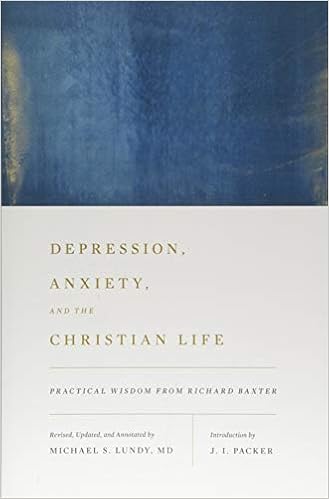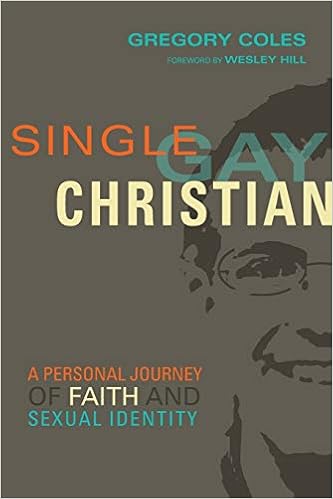
I love to read. It's enjoyable and relaxing for me, but it's also a way to sharpen my mind, strengthen my beliefs, and serve the people I know and love. To serve you I've decided to share a monthly summary of my top three recommended books. These represent three books I read in the previous month that I believe would most benefit you. Many of them can be found in our PBC bookstall, so let us know if you'd like to purchase one there. I hope they are a blessing to you.

Depression, Anxiety, and the Christian Life: Practical Wisdom from Richard Baxter (Michael Lundy, Editor)
I have rarely suffered from depression or anxiety. I know that could change, but in my short 35 years on this earth these are unfamiliar foes. At least for me personally. That said, I care deeply about the battles against depression and anxiety because some of the people I care about most in the world are beset by these struggles. Which is why I was drawn to this book edited by Michael Lundy.
Lundy compiles and annotates the writings of Puritan pastor Richard Baxter as he counseled his parishioners who struggled with depression and anxiety. Discard every unfair stereotype you've ever heard about Puritans. If Baxter is any indication of how Puritans did soul care, these men were gentle and loving in the way they cared for sinners and sufferers.
This book was one of the most helpful books I've ever read on understanding the battle with depression and learning how to counsel those who struggle. If you (or someone you love) is suffering in this way, learn how to battle biblically from the careful and gentle teaching of Richard Baxter.

The Victory of Reason: How Christianity Led to Freedom, Capitalism, and Western Success by Rodney Stark
This was a fascinating book. Rodney Stark goes to great pains to demonstrate why the Western world thrived while the East lagged behind for so many centuries. Stark convincingly demonstrates that the unique success of the West was rooted in Christian belief. If you're interested in history and the unique contribution of a Christian worldview to society, this book may be worth your time.

Single, Gay, Christian by Gregory Coles
Note: I am not endorsing this book, although I do think it’s an important book for thinking Christians to wrestle with. Read my review to understand why.
This is a hard book to review. On the one hand, Gregory Coles is a brilliant writer. This memoir is a captivating, well-written page-turner. By the time you read the last page you’ll feel as if you really know the author. And that’s a good thing, since this is a man made in the image of God who is bearing his soul in the pages of this book. It’s also a good thing because many evangelicals (including myself) don’t have a lot of experience with fellow Christians who experience same-sex attraction but desire to follow Jesus in obedience to the Bible’s prohibitions on homosexual behavior. So for all these reasons, Coles book is helpful.
But in many ways, this is an unhelpful book. If you couldn’t tell from the title, Coles embraces a gay identity alongside his Christian identity. Yes, he believes the Bible prohibits homosexual behavior but he still identifies as gay. In his mind his “gayness” is central to identity. It is not merely how he is, it is who he is.
In addition, Coles wonderings about God, faith, Scripture, and homosexuality are often very reflective of our postmodern age. He treats homosexuality as if it is a second or third level issue on which Jesus-followers can agree to disagree. He talks about truth in language of better/best instead of true/false. He talks about God’s will in mystical language of experiences and feelings rather than in concrete language about revelation and truth. Perhaps most dangerously, he downplays the importance of Christian fidelity and obedience when he records this conversation with a gay friend:
“Do you ever wonder if you might be wrong?” asked the voice on the other end of the phone.
“Of course,” I said. “I’m human. I could be wrong about everything. And that’s why I hope you won’t take anything I say at face value. Test it for yourself. Weigh it against the Bible. See if it turns out to be made of gold or Silly Putty.”
“And what if I decide it’s okay to be in a same-sex relationship? What if I get married to another guy?”
“Then I’ll still love you. And I hope you’ll still love me too. And I’ll pray that both of us fall more desperately in love with Jesus, that we keep becoming more willing to give u everything for the sake of the cross.” . . .
“How can you risk it?” said my friend. “How can any of us risk being wrong on something this big?”
“I’m convinced,” I said, “that in the end, God is more concerned with the depth and the recklessness of our love for him than he is with our right answers (111-12).”
Worded this way we might be tempted to agree with Coles. After all, is having all the right answers really all that important? That depends. But in context, Coles is not talking about answers to periphery questions like “how long is the tribulation?” or “who was Cain’s wife?” He’s talking about matters like “what does it mean to follow Jesus?” “What does Christian obedience look like?” “When the Bible says those who practice homosexuality enter into the kingdom of heaven, does it really mean it?”
Although I commend Coles for his willingness to say, “yes celibacy is essential for those who experience exclusive same-sex attraction,” I fear he is taking back with his left hand what he gives with his right. He has chosen the right path for himself, but he constantly presents truth on a spectrum, as if there is one path that is right for him but others must choose that which is right for them. And in the end, what matters most is that the individual has a reckless love for God. But what if the recklessness of our love is measured by our obedience? Isn’t that, after all, what Jesus taught His disciples?
All in all, I think Coles book would be helpful for the mature Christian to read. It will force you to think, to engage some ideas you may not be used to engaging. But I would also recommend you read it alongside books like “What Does the Bible Say About Homosexuality” by Kevin DeYoung, “The Secret Thoughts of an Unlikely Convert” by Rosaria Butterfield or anything by Sam Allberry. I believe in what they’ve written you’ll find a compassion that rivals what Coles has written, but alongside that compassion you’ll also see a rootedness to truth that this book deeply lacks.
Yes, we must love Jesus with a fervent love. But we simply cannot do that unless that love is rooted in truth.
